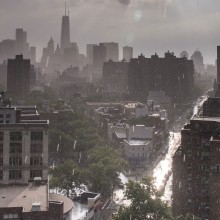
Then, by the light of their own destruction, I saw them staggering and falling, and their supporters turning to run.
I stood staring, not as yet realising that this was death leaping from man to man in that little distant crowd. All I felt was that it was something very strange. An almost noiseless and blinding flash of light, and a man fell headlong and lay still; and as the unseen shaft of heat passed over them, pine trees burst into fire, and every dry furze bush became with one dull thud a mass of flames. And far away towards Knaphill I saw the flashes of trees and hedges and wooden buildings suddenly set alight.
It was sweeping round swiftly and steadily, this flaming death, this invisible, inevitable sword of heat. I perceived it coming towards me by the flashing bushes it touched, and was too astounded and stupefied to stir. I heard the crackle of fire in the sand pits and the sudden squeal of a horse that was as suddenly stilled. Then it was as if an invisible yet intensely heated finger were drawn through the heather between me and the Martians, and all along a curving line beyond the sand pits the dark ground smoked and crackled. Something fell with a crash far away to the left where the road from Woking station opens out on the common. Forth-with the hissing and humming ceased, and the black, dome-like object sank slowly out of sight into the pit.
All this had happened with such swiftness that I had stood motionless, dumbfounded and dazzled by the flashes of light. Had that death swept through a full circle, it must inevitably have slain me in my surprise. But it passed and spared me, and left the night about me suddenly dark and unfamiliar.



When Passepartout heard what this last voyage was going to cost, he uttered a prolonged “Oh!” which extended throughout his vocal gamut. As for Fix, he said to himself that the Bank of England would certainly not come out of this affair well indemnified.
When they reached England, even if Mr. Fogg did not throw some handfuls of bank-bills into the sea, more than seven thousand pounds would have been spent! An hour after, the Henrietta passed the lighthouse which marks the entrance of the Hudson, turned the point of Sandy Hook, and put to sea.
During the day she skirted Long Island, passed Fire Island, and directed her course rapidly eastward. At noon the next day, a man mounted the bridge to ascertain the vessel’s position. It might be thought that this was Captain Speedy. Not the least in the world.
It was Phileas Fogg, Esquire. As for Captain Speedy, he was shut up in his cabin under lock and key, and was uttering loud cries, which signified an anger at once pardonable and excessive.
What had happened was very simple. Phileas Fogg wished to go to Liverpool, but the captain would not carry him there. Then Phileas Fogg had taken passage for Bordeaux, and, during the thirty hours he had been on board, had so shrewdly managed with his banknotes that the sailors and stokers, who were only an occasional crew, and were not on the best terms with the captain, went over to him in a body.
This was why Phileas Fogg was in command instead of Captain Speedy; why the captain was a prisoner in his cabin; and why, in short, the Henrietta was directing her course towards Liverpool. It was very clear, to see Mr. Fogg manage the craft, that he had been a sailor. How the adventure ended will be seen anon.
Aouda was anxious, though she said nothing. As for Passepartout, he thought Mr. Fogg’s manoeuvre simply glorious. The captain had said “between eleven and twelve knots,” and the Henrietta confirmed his prediction. If, then—for there were “ifs” still—the sea did not become too boisterous,
the Henrietta might cross the three thousand miles from New York to Liverpool in the nine days, between the 12th and the 21st of December. It is true that, once arrived, the affair on board the Henrietta, added to that of the Bank of England, might create more difficulties for Mr. Fogg than he imagined or could desire.